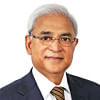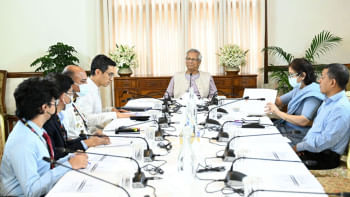Dreaming beyond limits: the inspirational stories of Tapan Chowdhury

In the last three decades, the pharmaceuticals industry of the country has witnessed a phenomenal growth, cementing its place as one of the industrial success stories of Bangladesh, next to that of the apparels industry. With a market size of USD 3 billion, which accounts for 1.38% of the nation's GDP, the pharmaceuticals industry currently meets 98% of the local demand, while exporting to more than 100 countries around the world.
In the 1950s, the pharmaceuticals industry of the country was dominated by large multinational companies, with a very few local companies operating in the market. Today, the industry has excelled beyond the domestic market, ranking 71st out of 134 countries in the world in terms of global pharmaceutical exports. This has been made possible for the visionary leaders who had shown the intent and determination in building the very foundation of the industry, almost 70 years ago.
In 1958, Square Pharmaceuticals was founded by Samson H Chowdhury and three of his friends, who had put in a capital investment of BDT 5,000 each. Today, the company is a market leader in the country, and has diversified into multiple other businesses, turning into a conglomerate that yields an annual revenue of USD 1.2 billion and employs more than 60,000 employees. After the demise of Samson H Chowdhury, his four sons have taken the reigns in leading one of the largest conglomerates of the country.
One of his sons is Tapan Chowdhury, the Managing Director of Square Pharmaceuticals and Chairman of Square Textiles Limited whose vision and far-sightedness are the driving forces behind the success of Square Group. The first episode of Prerona Kotha Season 03 was graced by this pioneer leader, who in a lively interview, shared the stories of his inspirations, his experiences, and spoke in length about his values and principles, the challenges he has had to overcome and the learnings, and most importantly, his game plan in achieving "success".
Tapan Chowdhury was born in the village of Ataikula, 12 miles away from the city of Pabna. His primary education started off from Pabna, and later he was admitted in a boarding school for some time. After SSC from Pabna Zilla School and HSC from Notre Dame College in Dhaka, he studied at the University of Dhaka and later, went to United Kingdom for higher studies.
When asked about his inspiration for joining the family's pharmaceuticals business, he credited his father being the motivating factor. He reminisced the times in his childhood, he used to spend at Square's plant with his father. "I had spent so much of my childhood wandering the corners of the manufacturing plant. I was ever curious about how the tablets are made, or the bottles of syrups are produced. In my youth, I often used to work in the packaging line at our plant. So the interest was always there. Even when I returned home from studying abroad, I had spent plenty time in our plant," he said.
Coming back to Bangladesh, he started to work in the marketing department, which involved promotion of Square's products and building good relationships with doctors and pharmacists around the country.
Besides talking about Square's business, Tapan Chowdhury also spoke about the remarkable values that the company has been built on. He talked about the philosophy of his late father, the Founder Chairman of Square Group, who had instilled a sense of belonging to a family, in all the employees who have had worked for Square since its inception.
This is reflected in Square's culture, where all the employees of Square, from the managers to the floor-staff—irrespective of their ranks—sit together to have lunch in the same space, just like a family does.
The practice helps create a congenial environment where employees can also share any issues and challenges with the top management, without any hesitance.
In Tapan Chowdhury's words "The biggest strength of Square are its people, or as we like to say 'the Square family'. . . When my father started the business, he received immense support from my mother. She used to tell us to treat the company like a family. And the philosophy has stayed with us ever since."
Square Pharmaceuticals Limited, a company founded with an investment of just BDT 20,000 has grown to be a billion-dollar conglomerate, expanding the scope of business in multiple sectors including healthcare, consumer products, textiles and media.
When asked about the decision that had led to the diversification, Tapan Chowdhury said, "We never had plans for growing to be a conglomerate . . . When we started to see success in pharma, it really happened very fast. We became a cash-rich company within a short period. So, we did not want to limit the growth within a single basket of sorts. There came the thought of diversifying."
Square's diversification started off with venturing into toiletries manufacturing and then into textiles, as the country's RMG industry was flourishing during the early 80s. Today, Square Pharmaceuticals has ventured beyond domestic periphery, establishing manufacturing plant in Kenya, and in turn becoming a Bangladeshi origin multinational company.
Speaking about the importance of commitment and integrity in business, Tapan Chowdhury told us stories about the great length his father had gone to keep the promises he had made to his shareholders during the initial public offering (IPO) of Square Pharmaceuticals in 1995.
"My father said, all shareholders from the IPO of Square Pharmaceuticals will be given equity to our textiles company, free of cost . . . However, interestingly, the government vetoed at our idea of issuing free-of-cost shares . . . But my father disagreed. He said, 'I have promised my shareholders of the free-of-cost shares.' And he filed a lawsuit in the High Court . . . In his words, it does not matter if he had to go to High Court or knock the doors of Supreme Court.
But he will not compromise on his commitment. The High Court ruled in favour of my father and all shareholders from initial offering were given shares to our textiles company, for free," Tapan Chowdhury recalled. This is an exemplary case of ideologies on which Square has been built on, and the trust from people it has garnered over the years.
In discussing entrepreneurship and the startup culture in Bangladesh, Tapan Chowdhury applauded the initiatives by the Bangladeshi youth and emphasised the importance of networking and effective marketing of products to the investors.
He said, "We have a lot of brilliant young minds at the helm of these start-ups. I congratulate them on their achievement and agree with their entrepreneurial mindset. I believe in their capabilities . . . And now, the banks as well as the government have come forward to support these entrepreneurs. They are welcoming of their ideas . . . But, a lot of these initiatives seem to struggle in commercialising their products or services, failing to reach the customers."
While he commended the youth for their potential, he also advised the youth to be wary of lack of discipline and maintain a healthy lifestyle, which could be impedance to their success.
In his interview at Preronar Kotha, Tapan Chowdhury expressed his delight in being fortunate enough to be born a Bangladeshi. He believes, Bangladesh is a country with boundless opportunities, a country where people can dream big, and create impact on others' lives through their action. He summed up his philosophies in life, recounting the wisdom his father had parted on him about doing the right things for people and the country.
He said, "My father used to tell me, 'Wearing nice clothes or using a nice car would only create a momentary impression. But, you will be remembered more for being a good human being. Create a good organisation, and you will be revered by thousands and millions.' These are important life lessons".
Tapan Chowdhury's love for the country, the passion to work for the betterment of country's people is reflected in his own words, "We have to make this country better. And anything we do counts as our contribution. Our lives are not everlasting after all. But any good deeds in this life will last for long."
The interviewer, Dr Melita Mehjabeen, is a professor of the Institute of Business Administration under the University of Dhaka. She took the interview as part of "Preronar Kotha", a thought leadership broadcast by Prerona Foundation.

 For all latest news, follow The Daily Star's Google News channel.
For all latest news, follow The Daily Star's Google News channel. 






Comments